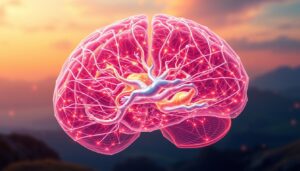Did you know that your colon plays a crucial role in more than just digestion? Research reveals that the gut, often referred to as the “second brain,” produces 95% of the body’s serotonin, a neurotransmitter essential for regulating mood, memory, and emotional wellbeing1.
The gut microbiome, composed of trillions of bacteria, significantly influences mental health. Studies show that an imbalance in gut bacteria, known as dysbiosis, is linked to conditions like anxiety, depression, and irritable bowel syndrome2. This highlights the intricate connection between your gut and brain, often referred to as the gut-brain axis.
Dietary choices can alter gut microbiome diversity, impacting mood and mental health. For instance, ultra-processed foods have been associated with higher rates of depression and disordered eating1. Conversely, a diet rich in fiber can strengthen the gut lining, reducing the risk of infections and promoting a balanced microbiome1.
Key Takeaways
- The colon influences mood and mental wellbeing through serotonin production.
- An imbalanced gut microbiome is linked to mental health conditions.
- Dietary choices significantly impact gut health and mood regulation.
- The gut-brain axis communicates through nerve, chemical, and hormone signaling.
- Ultra-processed foods may increase the risk of mental health disorders.
Introduction: Exploring the Gut-Brain Connection
The gut-brain axis is a vital communication network that links your digestive system to your central nervous system. This intricate relationship is crucial for maintaining both physical and mental health.
What the Gut-Brain Axis Is
The gut-brain axis operates primarily through the vagus nerve, which transmits signals between the gut and the brain. Approximately 90% of these signals are sent from the gut to the brain, showing how much influence your gut has on your mental state3.
Your gut is home to the enteric nervous system, often called the “second brain,” which contains over 500 million neurons. This system produces neurotransmitters like serotonin, with about 90% of the body’s serotonin being made in the gut3.
Why Your Colon Matters
The colon plays a key role in maintaining a healthy balance of gut bacteria, known as the microbiome. A diverse microbiome is linked to better mental health, with studies suggesting it may reduce the risk of anxiety and depression by up to 25%3.
Disruptions in the gut microbiome, or dysbiosis, are associated with mental health conditions. For example, around 30% of people with irritable bowel syndrome (IBS) also experience anxiety disorders3.
Understanding the gut-brain connection helps explain how lifestyle and dietary changes can impact mental wellbeing. This knowledge forms the basis for strategies to improve both gut health and mental health.
Understanding Your Colon’s Role in Mood Regulation
Did you know that your colon plays a crucial role in more than just digestion? Research reveals that the gut, often referred to as the “second brain,” produces 95% of the body’s serotonin, a neurotransmitter essential for regulating mood, memory, and emotional wellbeing4.
The gut microbiome, composed of trillions of bacteria, significantly influences mental health. Studies show that an imbalance in gut bacteria, known as dysbiosis, is linked to conditions like anxiety, depression, and irritable bowel syndrome5. This highlights the intricate connection between your gut and brain, often referred to as the gut-brain axis.
Dietary choices can alter gut microbiome diversity, impacting mood and mental health. For instance, ultra-processed foods have been associated with higher rates of depression and disordered eating4. Conversely, a diet rich in fiber can strengthen the gut lining, reducing the risk of infections and promoting a balanced microbiome4.
Hormonal Influences and Neurotransmitter Production
The colon influences the production of mood-regulating hormones and neurotransmitters like serotonin and dopamine. The relationship between the gut and the brain is mediated through these chemicals, which directly impact your emotional state.
| Neurotransmitter | Role in Mood Regulation | Dietary Influence |
|---|---|---|
| Serotonin | Regulates mood, memory, and emotional wellbeing4 | Fiber-rich foods, probiotics |
| Dopamine | Associated with pleasure and reward | Omega-3 fatty acids, antioxidants |
| GABA | Calms nerve activity | Fermented foods |
Research demonstrates that specific dietary components directly impact neurotransmitter production. For example, a diet high in fiber promotes the production of serotonin, while probiotics support dopamine levels4. This physiological link between gut activity and mood disorders emphasizes the importance of dietary choices in maintaining mental health.
The Science Behind the Gut Microbiome and Mental Health
The gut microbiome plays a crucial role in mental health, with research showing a strong link between gut health and conditions like anxiety and depression6. This bidirectional communication network, known as the gut-brain axis, involves anatomical, endocrine, and immune pathways that connect the enteric and central nervous systems7.
Key Research Findings
Studies have found that individuals with mental health disorders often exhibit signs of dysbiosis, an imbalance in gut bacteria. For instance, a 2017 systematic review of 10 clinical trials reported positive results on depressive symptoms following probiotic interventions7. Additionally, a 2002 study showed a 40.7% improvement in general condition among adults suffering from stress or exhaustion after 6 months of probiotic supplementation7.
Clinical Study Insights
Clinical studies have demonstrated the effectiveness of probiotics in reducing anxiety and depressive symptoms. A double-blind, randomized placebo-controlled trial found that a multistrain probiotic significantly reduced cognitive reactivity to depression, particularly aggressive and ruminative thoughts7. Furthermore, research indicates that probiotics can alter the expression of genes involved in serotonin signaling, beneficially impacting mental health7.
| Study Type | Findings | Impact |
|---|---|---|
| Double-blind, randomized placebo-controlled trial | Reduced cognitive reactivity to depression | Significant reduction in aggressive and ruminative thoughts |
| 2017 systematic review | Positive results on depressive symptoms | Improved mental health outcomes |
| 2002 study | 40.7% improvement in general condition | Alleviation of stress and exhaustion |
These findings underscore the importance of maintaining a healthy gut microbiome through diet and probiotics to support mental wellbeing.
Diet and Gut Health: The Foundation of Wellbeing
Your diet is the cornerstone of a healthy gut and overall wellbeing. The food you eat directly influences the balance of your gut microbiome, which in turn affects your mental and physical health. A well-balanced diet provides the necessary nutrients to support beneficial bacteria, promoting a robust immune system and mental clarity.
Nutrient Composition and Its Effects
A diet rich in fiber, healthy fats, and proteins creates an environment where beneficial bacteria thrive. These nutrients help maintain a diverse gut microbiome, which is linked to better mental health outcomes8. For instance, fiber promotes the production of short-chain fatty acids, which strengthen the intestinal barrier and enhance immune function8.
- Fiber: Found in fruits, vegetables, and whole grains, it nourishes beneficial bacteria and promotes a healthy gut lining.
- Healthy Fats: Sources like avocados and nuts support the absorption of fat-soluble vitamins and reduce inflammation.
- Proteins: Essential for repairing tissues and producing enzymes that aid digestion and immune function.
Research shows that adopting a Mediterranean or DASH diet can improve mood and reduce the risk of mental health disorders8. These diets emphasize whole foods, reducing the intake of processed and sugary items that can harm gut health.
Practical recommendations include increasing fiber intake, incorporating fermented foods for probiotics, and limiting ultra-processed foods. Staying hydrated and managing portion sizes also support optimal digestion and nutrient absorption.
By making informed dietary choices, you can enhance gut function and mental clarity, fostering overall wellbeing.
Beyond Digestion: How Your Colon Affects Your Mood and Mental Wellbeing
Your diet plays a significant role in shaping your emotional state, with research showing a direct link between food choices and mental health. The gut microbiome, influenced by your diet, produces neurotransmitters like serotonin and dopamine, which regulate mood and emotional responses9.
Direct Links Between Diet and Emotions
Studies reveal that dietary changes can alter gut properties, leading to improved emotional wellbeing. For instance, a diet rich in fiber increases serotonin production, enhancing mood regulation10. Conversely, ultra-processed foods disrupt gut balance, potentially worsening mental health conditions11.
| Dietary Factor | Effect on Mental Health |
|---|---|
| Fiber Intake | Boosts serotonin levels, improving mood9 |
| Probiotics | Supports dopamine production, enhancing emotional stability10 |
| Ultra-processed Foods | Linked to higher rates of depression and anxiety11 |
Research highlights that adopting a diet rich in prebiotics and probiotics can serve as a non-pharmacological treatment for mood disorders. For example, a Mediterranean diet has been shown to reduce depression risk by fostering a healthy gut microbiome9. These findings underscore the importance of dietary choices in maintaining mental wellbeing.
The Impact of Probiotics and Prebiotics on Your Mind
Probiotics and prebiotics play a vital role in maintaining a healthy gut, which in turn supports mental wellbeing. These beneficial microorganisms help regulate the body’s immune system and hormone production, creating a balanced environment that fosters emotional stability.
Benefits of Probiotic Foods
Probiotic-rich foods such as yogurt, kefir, and fermented vegetables are essential for a healthy gut. They modulate the immune system, promote hormonal balance, and support the production of neurotransmitters like serotonin and dopamine, which are crucial for mood regulation12.
- Probiotics: These live microorganisms enhance gut health and mental wellbeing by producing neurotransmitters that improve mood and cognitive function13.
- Prebiotics: Non-digestible fibers that feed beneficial bacteria, promoting a balanced gut microbiome and reducing inflammation14.
The integration of prebiotics with probiotics supports friendly gut bacteria, essential for mood regulation. A balanced flora reduces inflammation, improving both gut and brain function1213.
Strategies for Maintaining a Healthy Gut-Brain Axis
Keeping your gut and brain connection strong can have big benefits for your health. Lifestyle changes play a key role in this process.
Lifestyle Changes for Improved Digestion
Regular exercise is a great way to keep your gut healthy. It can help your digestive system work better and even boost the good bacteria in your gut15.
- Try activities like walking or cycling for at least 30 minutes most days.
- Strength training can also help keep your gut in good shape.
Exercise, Sleep, and Stress Management
Sleep is very important for gut health. It helps your body recover and keeps your gut microbiome balanced16.
- Aim for 7-9 hours of quality sleep each night.
- Try to go to bed and wake up at the same time every day.
Stress can hurt your gut and brain connection. Finding ways to manage stress can make a big difference.
- Practice deep breathing or meditation daily.
- Yoga can help reduce stress and improve digestion.
These changes can help keep your gut and brain connection strong, leading to better overall health and wellbeing.

Navigating Dietary Changes for Better Mental Wellness
Exploring different diets can have a significant impact on both gut health and mental wellness. Research shows that dietary changes can alter the balance of gut microbiota, leading to improved mental health outcomes. For instance, studies indicate that adopting a Vegetarian diet can increase gut bacterial diversity, which is linked to better emotional stability and reduced anxiety levels17.
Exploring Vegetarian, Mediterranean, and Ketogenic Diets
A Vegetarian diet, rich in fiber and antioxidants, has been shown to promote a healthy gut microbiome. This, in turn, supports the production of neurotransmitters like serotonin, which play a crucial role in mood regulation. Similarly, the Mediterranean diet, with its emphasis on whole grains, fruits, and vegetables, has been associated with a lower risk of depression and improved cognitive function18.
The Ketogenic diet, while lower in fiber, has also shown promise in improving mental health. By reducing inflammation and promoting the growth of beneficial gut bacteria, this diet can help alleviate symptoms of anxiety and depression. Studies have found that participants who adopted a Ketogenic diet experienced a significant reduction in anxiety scores, highlighting its potential as a dietary intervention for mental health17.
These dietary approaches not only improve gut health but also enhance overall immune function. By making informed choices about the foods you eat, you can take a proactive step toward better mental wellness. Remember, small changes can lead to big differences in how you feel and function18.
How Food Choices Influence Stress, Anxiety, and Depression
Food plays a pivotal role in shaping your mental health, with research highlighting how specific nutrients can either worsen or improve stress, anxiety, and depression. The nervous system, particularly the gut-brain axis, is directly influenced by dietary choices, creating a powerful link between your diet and emotional wellbeing.
Carbohydrates, for instance, can have a pronounced impact on anxiety levels. Studies show that high carbohydrate intake may increase anxiety in some individuals19. Conversely, fats and proteins, especially those from healthy sources like avocados and lean meats, have been linked to reduced symptoms of depression and anxiety20.
- Fiber intake: Diets rich in fiber can enhance serotonin production, which helps regulate mood and reduce stress19.
- Probiotics: Foods like yogurt and kefir support gut health, promoting a balanced microbiome that’s essential for emotional stability20.
- Ultra-processed foods: These can disrupt gut microbiota, potentially worsening mental health conditions21.
Incorporating these insights, you can adjust your diet to support mental health. Focus on whole, nutrient-dense foods and consider probiotic-rich options to foster a healthy gut-brain connection. Remember, small dietary changes can lead to significant improvements in how you feel and function.
The Role of the Vagus Nerve in Gut-Brain Communication
The vagus nerve acts as a vital bridge between your gut and brain, facilitating communication that impacts both physical and mental health. It is responsible for 80–90% of all fibers involved in afferent pathways, sending information from the gut to the brain22.
This bidirectional communication network plays a crucial role in regulating stress responses and has been shown to influence anxiety and depressive-like behaviors23. The vagus nerve is highly innervated in the gastrointestinal tract, connecting the central nervous system with the intestinal immune system23.

Techniques to Stimulate the Vagus Nerve
Stimulating the vagus nerve can improve digestion and reduce stress. Simple techniques include diaphragmatic breathing exercises and meditative practices that can be easily implemented into your daily routine22.
| Technique | Description | Benefits |
|---|---|---|
| Diaphragmatic Breathing | Engages the diaphragm to promote deep breathing | Reduces stress and anxiety |
| Meditative Practices | Includes mindfulness and relaxation exercises | Enhances mental clarity and gut function |
Clinical studies have demonstrated the benefits of activating the vagus nerve for mental clarity and stress reduction. For example, vagus nerve stimulation (VNS) has shown promise in treating conditions like depression and PTSD22.
By incorporating these techniques into your daily routine, you can improve gut-brain communication and overall wellbeing23.
Emerging Research on Gut-Brain Interactions
Recent studies have uncovered groundbreaking insights into the intricate relationship between the gut and brain, revealing how microbiota composition influences cognitive functions and emotional health. The gut-brain axis, a bidirectional communication network, plays a pivotal role in this interaction, with gut microbes producing neuroactive compounds that act on the brain24.
Recent Studies and Their Implications
Research has shown that disruptions in the gut microbiome are linked to anxiety and depressive-like behaviors in mice24. Additionally, studies indicate that specific intestinal microbes, such as Faecalibacterium and Coprococcus, are associated with markers of quality of life in individuals with depression25.
- Microbiota Composition: The balance of Firmicutes and Bacteroidetes phyla, which make up about 90% of gut microbiota, significantly impacts mental health outcomes25.
- Diagnostic Measures: New indices are being developed to assess gut health and its connection to brain function, offering potential early warning signs for mental health disorders26.
These findings open new avenues for therapeutic strategies, such as fecal microbiota transplantation, which has shown promise in resolving infections and improving mental health symptoms2624. As research advances, the future of gut-brain study holds potential for innovative treatments targeting both gut and brain health.
Practical Tips to Enhance Your Gut Health
Improving your gut health can have a significant effect on your overall wellbeing. By implementing simple, everyday strategies, you can create a balanced environment that supports both your digestive system and mental health.
Daily Strategies to Boost Digestion
A healthy gut begins with proper nutrition and consistent habits. Incorporating fiber-rich foods, staying hydrated, and managing stress are essential steps to enhance gut function and reduce the risk of disorders like IBS27.
| Strategy | Effect | Behavior Change |
|---|---|---|
| Fiber Intake | Supports gut lining health | Aim for 25-30 grams daily |
| Regular Exercise | Boosts beneficial bacteria | 30 minutes, 3-4 times a week |
| Hydration | Improves nutrient absorption | Drink 8-10 glasses of water |
Research shows that regular moderate exercise can strengthen health-boosting gut microbes, while drinking plenty of water increases gut bacteria diversity and assists in nutrient absorption27. Additionally, maintaining consistent eating schedules helps regulate hunger hormones and promotes optimal digestion28.
By focusing on these practical tips, you can take proactive steps toward improving your gut health and overall mental wellbeing. Remember, small changes today can lead to significant benefits tomorrow.
Mind-Body Approaches for Optimal Digestive Health
Exploring the connection between your mind and gut can lead to significant improvements in both mental and digestive health. Mind-body practices offer a holistic approach to managing stress and enhancing digestion.
Incorporating Meditative Practices
Meditation is a powerful tool for reducing stress and improving gut function. Techniques like guided meditation and hypnotherapy can help calm your mind, which in turn supports your digestive system. These practices have been shown to lower stress levels and improve the fiber-mediated functions of the gut29.
- Guided Meditation: Helps reduce anxiety and promotes a balanced gut microbiome.
- Deep Breathing: Can enhance oxygen flow to the gut, improving digestion and reducing discomfort.
Therapeutic Approaches for Stress Reduction
Stress management is crucial for maintaining a healthy gut. Techniques such as mindful eating and focused breathing can help manage stress and improve digestive efficiency. These practices not only reduce stress but also support the production of neurotransmitters that regulate gut function.
- Mindful Eating: Encourages awareness of eating habits, improving digestion and nutrient absorption.
- Focused Breathing: Reduces stress hormones, promoting a relaxed digestive system.
Research indicates that mindfulness-based stress reduction programs are effective for various chronic health conditions, including gastrointestinal disorders30. By incorporating these practices, you can enhance your gut health and overall wellbeing.
Conclusion
Emerging research underscores the profound impact of gut health on mental wellbeing, revealing a intricate relationship that goes beyond digestion. Studies indicate that approximately 280 million people globally suffer from depression31, highlighting the urgency for holistic approaches to mental health.
A healthy colon and balanced gut microbiome play a crucial role in regulating mood and emotional stability. The gut microbiome, composed of trillions of microorganisms32, produces neurotransmitters like serotonin and dopamine, which are essential for cognitive function and emotional health.
To support mental wellbeing, consider adopting dietary changes, lifestyle modifications, and mind-body techniques. These proactive steps can foster a balanced gut microbiome, reducing the risk of mood disorders and enhancing overall health.
Ongoing research and development in gut-brain interaction treatments are vital for advancing our understanding and improving therapeutic options. This insights should be viewed as part of a broader service offering aimed at enhancing overall health and quality of life.
FAQ
What is the gut-brain axis and how does it influence mental health?
Can probiotics help reduce symptoms of anxiety and depression?
How does diet impact the relationship between gut health and mental wellbeing?
What role does serotonin play in gut health and mood regulation?
Can stress affect the gut microbiome and overall health?
How does the immune system interact with the gut microbiome?
What are the benefits of a high-fiber diet for gut health?
Can changes in gut bacteria lead to behavioral changes?
How does the vagus nerve contribute to gut-brain communication?
What are some practical ways to improve gut health?
Source Links
- What is the gut-brain connection? – https://www.helpguide.org/wellness/nutrition/gut-brain-connection
- The Gut-Brain Connection — Does It Go Beyond Butterflies? | Live Healthy – https://livehealthy.muhealth.org/stories/gut-brain-connection-does-it-go-beyond-butterflies-linking-gut-and-mental-health
- What To Know About the Gut-Brain Connection – https://my.clevelandclinic.org/health/body/the-gut-brain-connection
- That gut feeling – https://www.apa.org/monitor/2012/09/gut-feeling
- Unraveling the Gut Microbiota: Implications for Precision Nutrition and Personalized Medicine – https://pmc.ncbi.nlm.nih.gov/articles/PMC11597134/
- Gut microbiota’s effect on mental health: The gut-brain axis – https://pmc.ncbi.nlm.nih.gov/articles/PMC5641835/
- The Gut-Brain Axis: Influence of Microbiota on Mood and Mental Health – https://pmc.ncbi.nlm.nih.gov/articles/PMC6469458/
- Elucidating the role of diet in maintaining gut health to reduce the risk of obesity, cardiovascular and other age-related inflammatory diseases: recent challenges and future recommendations – https://pmc.ncbi.nlm.nih.gov/articles/PMC10773664/
- More Than a Gut Feeling: How Your Microbiome Affects Your Mood | Cognitive Enhancement – https://longevity.stanford.edu/lifestyle/2024/04/08/more-than-a-gut-feeling-how-your-microbiome-affects-your-mood/
- Think Twice: How the Gut’s “Second Brain” Influences Mood and Well-Being – https://www.scientificamerican.com/article/gut-second-brain/
- How Your Gut Bacteria Influences Your Emotions – https://www.wbur.org/onpoint/2015/06/29/gut-bacteria-influences-mood
- What Are Probiotics & What Do They Do? – https://my.clevelandclinic.org/health/treatments/14598-probiotics
- The Gut-Brain Connection: How Your Microbiome Affects Mental Health — Gastro Florida – https://gastrofl.com/the-gut-brain-connection-how-your-microbiome-affects-mental-health/
- Frontiers | Unveiling the therapeutic symphony of probiotics, prebiotics, and postbiotics in gut-immune harmony – https://www.frontiersin.org/journals/nutrition/articles/10.3389/fnut.2024.1355542/full
- Improving your gut health improves all aspects of your health, including your mood – https://www.uchealth.org/today/improving-gut-health-improves-all-aspects-of-your-health/
- How to maintain a healthy gut | Psyche Guides – https://psyche.co/guides/how-to-maintain-a-healthy-gut-for-a-healthy-mind-and-body
- The Role of Diet on the Gut Microbiome, Mood and Happiness – https://pmc.ncbi.nlm.nih.gov/articles/PMC10055576/
- The Impact of Diet and Lifestyle on Gut Microbiota and Human Health – https://pmc.ncbi.nlm.nih.gov/articles/PMC4303825/
- Stress, depression, diet, and the gut microbiota: human–bacteria interactions at the core of psychoneuroimmunology and nutrition – https://pmc.ncbi.nlm.nih.gov/articles/PMC7213601/
- Role of diet and its effects on the gut microbiome in the pathophysiology of mental disorders – Translational Psychiatry – https://www.nature.com/articles/s41398-022-01922-0
- Frontiers | Prebiotics for depression: how does the gut microbiota play a role? – https://www.frontiersin.org/journals/nutrition/articles/10.3389/fnut.2023.1206468/full
- Vagus Nerve as Modulator of the Brain–Gut Axis in Psychiatric and Inflammatory Disorders – https://pmc.ncbi.nlm.nih.gov/articles/PMC5859128/
- Vagus Nerve and Underlying Impact on the Gut Microbiota-Brain Axis in Behavior and Neurodegenerative Diseases – https://pmc.ncbi.nlm.nih.gov/articles/PMC9656367/
- Thinking from the Gut – Nature – https://www.nature.com/articles/518S13a
- Frontiers | Mood and microbes: a comprehensive review of intestinal microbiota’s impact on depression – https://www.frontiersin.org/journals/psychiatry/articles/10.3389/fpsyt.2024.1295766/full
- How your gut microbiome is linked to depression and anxiety – https://www.cas.org/resources/cas-insights/how-your-gut-microbiome-linked-depression-and-anxiety
- 5 Practical Tips to Maintain a Healthy Gut (easy and effective) – https://www.betterwayhealth.com/how-to-maintain-a-healthy-gut
- You Have Another ‘Brain’ in Your Gut—Plus, More Key Gut Health Tips From Doctors – https://www.prevention.com/health/a60986875/gut-health-tips/
- Mindful Eating: A Review Of How The Stress-Digestion-Mindfulness Triad May Modulate And Improve Gastrointestinal And Digestive Function – https://pmc.ncbi.nlm.nih.gov/articles/PMC7219460/
- No title found – https://www.rupahealth.com/post/the-gut-brain-axis-in-clinical-practice-functional-approaches-to-mental-wellness
- Mood and microbes: a comprehensive review of intestinal microbiota’s impact on depression – https://pmc.ncbi.nlm.nih.gov/articles/PMC10884216/
- The Link Between Gut Health & Mental Health – Northeast Digestive – https://northeastdigestive.com/blog/the-link-between-gut-health-mental-health/




